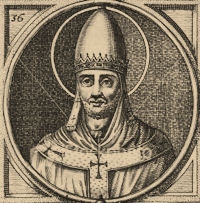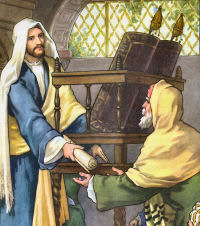Easter: April 12th
Tuesday of the Third Week of Easter
Other Commemorations: Julius I, Pope (RM)
» Enjoy our Liturgical Seasons series of e-books!
"I tell you most solemnly, it was not Moses who gave you bread from heaven, it is my Father who gives you the bread from heaven, the true bread; for the bread of God is that which comes down from heaven and gives life to the world." "Sir," they said "give us that bread always." Jesus answered: "I am the bread of life. He who comes to me will never be hungry; he who believes in me will never thirst."
Spirit of knowledge and piety, have mercy on us. Litany of the Holy Spirit for the election of a holy pope.
Meditation
It is certainly true that Christ, by His death on the cross and by His resurrection, has rendered perfect satisfaction, and effected man's redemption (Heb. 9:12); but we must not imagine that there is no further need of doing penance, or of working out our salvation. For, as the children of Israel, though freed from Pharaoh's bondage, had to fight long and against many enemies in order to gain the Promised Land, so also must we, though freed by Christ from the servitude of the devil, battle against our enemies to the end of our lives to obtain the promised, heavenly land, for no one is crowned unless he has properly fought (II Tim. 2:5). We must apply the merits of the redemption and satisfaction of Christ to our soul by the frequent reception of the holy sacraments; by imitating His virtues; by patiently bearing our trials and sufferings, and by a penitential life. The pious Angelus Silesius very appropriately writes:
"God is a Lamb that avails you not, my Christian,
If you become not also a lamb of God.
The cross on Golgotha redeems not from evil,
If it is not also erected in thee;
The dear Christ's death aids you not, my Christian,
Until in Him and for Him you also have died."
St. Julius I
 With Pope St. Julius the Papacy finds at its doorstep the vexing problem of the Eastern Arians. It is true that the Council of Nicaea had condemned Arianism, but in spite of that Arians had been growing in strength and had even gained the ear of Constantine, and what was more crucial, that of his son Constantius who succeeded him in the East.
With Pope St. Julius the Papacy finds at its doorstep the vexing problem of the Eastern Arians. It is true that the Council of Nicaea had condemned Arianism, but in spite of that Arians had been growing in strength and had even gained the ear of Constantine, and what was more crucial, that of his son Constantius who succeeded him in the East.
The man who was compelled to face the problem was Julius, a Roman who had been chosen to succeed Mark after an unexplained interval of four months. He soon received delegates from Alexandria asking him to acknowledge a certain Pistus as bishop of Alexandria in place of Athanasius, the mighty fighter for orthodoxy. The delegates tried to prove that Athanasius, who actually had been the victim of Arian intrigue, had been validly deposed. Athanasius on his part also sent envoys and later came to Rome in person to plead his case before the Pope. The Arians asked Julius to hold a synod to decide the case, but when in 341 Julius actually did convene it, they refused to attend. The Pope held it without them and over fifty bishops decreed that Athanasius had been unjustly condemned. Julius informed the Arians at Alexandria of this decision and let them know that he was displeased at their uncooperative attitude.
The Emperor Constans, who ruled in the West, was favorable to the orthodox Christians while his brother Constantius, who ruled the East, was pro Arian. At this time both Emperors agreed to hold a big general council to see if religious unity could be achieved. Pope Julius approved of the plan and sent legates to Sardica, the modern Sofia, where the council gathered. The council did not achieve religious unity because the Arians, when they found themselves outnumbered, walked out. The council once again vindicated Athanasius and once more repeated the solemn Nicene Creed. It also left an interesting set of regulations on the manner in which appeals to the pope should be made.
In spite of the repeated vindications of Athanasius, that good man was unable to return to his see. Emperor Constans supported the Arian George until the usurper died. Then and only then was the long-suffering Athanasius allowed to go home. Pope Julius, delighted, wrote a letter to the people of Alexandria, congratulating them on the return of their true bishop.
At Rome the number of Christians continued to grow during the pontificate of Julius. He built two new basilicas and three cemetery churches. The stay of St. Athanasius at Rome helped to popularize Egyptian monasticism and gave an impetus to religious life there.
Pope St. Julius died April 12, 352. He was buried in the Cemetery of Calepodius. His feast is celebrated on April 12.
—Excerpted from Popes Through the Ages by Joseph Brusher
Highlights and Things to Do:
- Learn more about Pope St. Julius:






